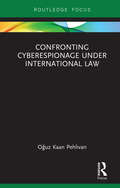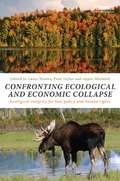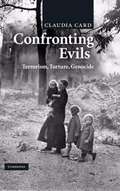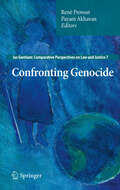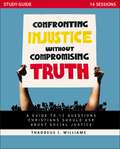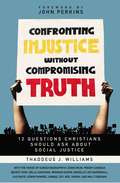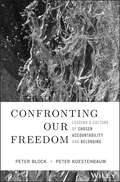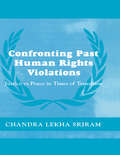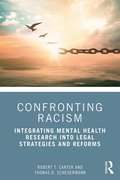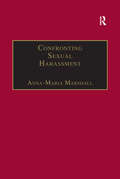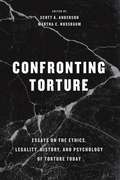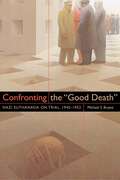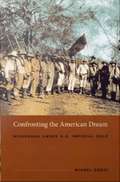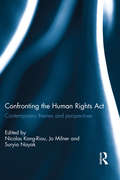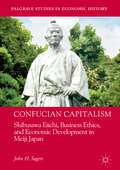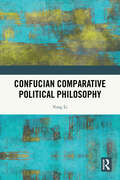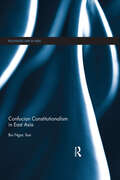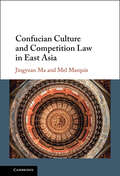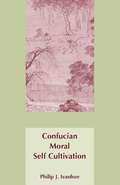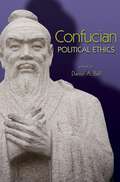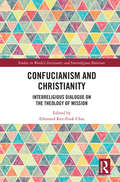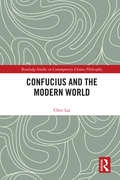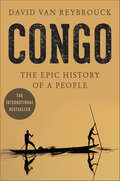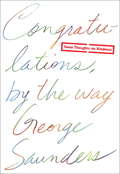- Table View
- List View
Confronting Cyberespionage Under International Law (Routledge Research in International Law)
by Oğuz Kaan PehlivanWe have witnessed a digital revolution that affects the dynamics of existing traditional social, economic, political and legal systems. This revolution has transformed espionage and its features, such as its purpose and targets, methods and means, and actors and incidents, which paves the way for the emergence of the term cyberespionage. This book seeks to address domestic and international legal tools appropriate to adopt in cases of cyberespionage incidents. Cyberespionage operations of state or non-state actors are a kind of cyber attack, which violates certain principles of international law but also constitute wrongful acquisition and misappropriation of the data. Therefore, from the use of force to state responsibility, international law offers a wide array of solutions; likewise, domestic regulations through either specialized laws or general principles stipulate civil and criminal remedies against cyberespionage. Confronting Cyberespionage Under International Law examines how espionage and its applications have transformed since World War II and how domestic and international legal mechanisms can provide effective legal solutions to this change, hindering the economic development and well-being of individuals, companies and states to the detriment of others. It shows the latest state of knowledge on the topic and will be of interest to researchers, academics, legal practitioners, legal advisors and students in the fields of international law, information technology law and intellectual property law.
Confronting Ecological and Economic Collapse: Ecological Integrity for Law, Policy and Human Rights
by Laura Westra Prue Taylor Agnès MichelotFrom the first appearance of the term in law in the Clean Water Act of 1972 (US), ecological integrity has been debated by a wide range of researchers, including biologists, ecologists, philosophers, legal scholars, doctors and epidemiologists, whose joint interest was the study and understanding of ecological/biological integrity from various standpoints and disciplines. This volume discusses the need for ecological integrity as a major guiding principle in a variety of policy areas, to counter the present ecological and economic crises with their multiple effects on human rights. The book celebrates the 20th anniversary of the Global Ecological Integrity Group and reassesses the basic concept of ecological integrity in order to show how a future beyond catastrophe and disaster is in fact possible, but only if civil society and ultimately legal regimes acknowledge the necessity to consider ecointegrity as a primary factor in decision-making. This is key to the support of basic rights to clean air and water, for halting climate change, and also the basic rights of women and indigenous people. As the authors clearly show, all these rights ultimately depend upon accepting policies that acknowledge the pivotal role of ecological integrity.
Confronting Evils: Terrorism, Torture, Genocide
by Claudia CardIn this new contribution to philosophical ethics, Claudia Card revisits the theory of evil developed in her earlier book The Atrocity Paradigm (2002), and expands it to consider collectively perpetrated and collectively suffered atrocities. Redefining evil as a secular concept and focusing on the inexcusability - rather than the culpability - of atrocities, Card examines the tension between responding to evils and preserving humanitarian values. This stimulating and often provocative book contends that understanding the evils in terrorism, torture and genocide enables us to recognise similar evils in everyday life: daily life under oppressive regimes and in racist environments; violence against women, including in the home; violence and executions in prisons; hate crimes; and violence against animals. Card analyses torture, terrorism and genocide in the light of recent atrocities, considering whether there can be moral justifications for terrorism and torture, and providing conceptual tools to distinguish genocide from non-genocidal mass slaughter.
Confronting Genocide (Ius Gentium: Comparative Perspectives on Law and Justice #7)
by Payam Akhavan René Provost"Never again" stands as one the central pledges of the international community following the end of the Second World War, upon full realization of the massive scale of the Nazi extermination programme. Genocide stands as an intolerable assault on a sense of common humanity embodied in the Universal Declaration of Human Rights and other fundamental international instruments, including the Convention on the Prevention and Punishment of the Crime of Genocide and the United Nations Charter. And yet, since the Second World War, the international community has proven incapable of effectively preventing the occurrence of more genocides in places like Cambodia, Yugoslavia, Rwanda and Sudan. Is genocide actually preventable, or is "ever again" a more accurate catchphrase to capture the reality of this phenomenon? The essays in this volume explore the complex nature of genocide and the relative promise of various avenues identified by the international community to attempt to put a definitive end to its occurrence. Essays focus on a conceptualization of genocide as a social and political phenomenon, on the identification of key actors (Governments, international institutions, the media, civil society, individuals), and on an exploration of the relative promise of different means to prevent genocide (criminal accountability, civil disobedience, shaming, intervention).
Confronting Injustice without Compromising Truth Study Guide: A Guide to 12 Questions Christians Should Ask About Social Justice
by Thaddeus J. WilliamsGod does not suggest, he commands that we do justice.Social justice is not optional for the Christian. All injustice affects others, so talking about justice that isn't social is like talking about water that isn't wet or a square with no right angles. But the Bible's call to seek justice is not a call to superficial, kneejerk activism. We are not merely commanded to execute justice, but to "truly execute justice." The God who commands us to seek justice is the same God who commands us to "test everything" and "hold fast to what is good."Drawing from a diverse range of theologians, sociologists, artists, and activists, Thaddeus Williams builds a case that we must be discerning if we are to "truly execute justice" as Scripture commands. Not everything called "social justice" today is compatible with a biblical vision of a better world. The Bible offers hopeful and distinctive answers to deep questions of worship, community, salvation, and knowledge that ought to mark a uniquely Christian pursuit of justice.In the Confronting Injustice without Compromising Truth Study Guide, Williams confronts our religious and political tribalism and challenges readers to discover what the Bible and the example of Jesus have to teach us about justice. He presents a compelling vision of justice for all God's image-bearers that offers hopeful answers to life's biggest questions.
Confronting Injustice without Compromising Truth: 12 Questions Christians Should Ask About Social Justice
by Thaddeus J. WilliamsGod does not suggest, he commands that we do justice.Social justice is not optional for the Christian. All injustice affects others, so talking about justice that isn't social is like talking about water that isn't wet or a square with no right angles. But the Bible's call to seek justice is not a call to superficial, kneejerk activism. We are not merely commanded to execute justice, but to "truly execute justice." The God who commands us to seek justice is the same God who commands us to "test everything" and "hold fast to what is good."Drawing from a diverse range of theologians, sociologists, artists, and activists, Confronting Injustice without Compromising Truth, by Thaddeus Williams, makes the case that we must be discerning if we are to "truly execute justice" as Scripture commands. Not everything called "social justice" today is compatible with a biblical vision of a better world. The Bible offers hopeful and distinctive answers to deep questions of worship, community, salvation, and knowledge that ought to mark a uniquely Christian pursuit of justice. Topics addressed include:RacismSexualitySocialismCulture WarAbortionTribalismCritical TheoryIdentity PoliticsConfronting Injustice without Compromising Truth also brings in unique voices to talk about their experiences with these various social justice issues, including:Michelle-Lee BarnwallSuresh BudhaprithiEddie ByunFreddie CardozaBecket CookBella DanusiarMonique DusonOjo OkeyeEdwin RamirezSamuel SeyNeil ShenviWalt SobchakIn Confronting Injustice without Compromising Truth, Thaddeus Williams transcends our religious and political tribalism and challenges readers to discover what the Bible and the example of Jesus have to teach us about justice. He presents a compelling vision of justice for all God's image-bearers that offers hopeful answers to life's biggest questions.
Confronting Our Freedom: Leading a Culture of Chosen Accountability and Belonging
by Peter Block Peter KoestenbaumExplore the nature of modern leadership In Confronting Our Freedom, a team of dedicated leadership coaches delivers an exciting and engaging new take on management and leadership. Drawing on recent events in the market and in the world, including the Great Resignation, the COVID-19 pandemic, and widespread digital transformation, the authors invite you to reimagine ideas of freedom and accountability in the context of work. You’ll explore how freedom of action—for managers and employees—is what gives rise to true accountability, both in the community and in the workplace. In the book, you’ll also find: Discussions of the power and structure of freedom, including its implications for our own choices and lives Ways to shift the focus of your leadership and management to accountability and freedom Strategies for shifting the illusion of clear roles and expectations to one compatible with fully human organizationsA groundbreaking and incisive approach to managing and leading others in virtual, hybrid, and in-person settings, Confronting Our Freedom will be an eye opener for managers, executives, and other business leaders seeking to improve their ability to inspire others to their fullest potential.
Confronting Past Human Rights Violations: Justice Vs Peace In Times Of Transition (Cass Series On Peacekeeping)
by Chandra Lekha SriramThis book examines what makes accountability for previous violations more or less possible for transitional regimes to achieve. It closely examines the other vital goals of such regimes against which accountability is often balanced. The options available are not simply prosecution or pardon, as the most heated polemics of the debate over transitio
Confronting Racism: Integrating Mental Health Research into Legal Strategies and Reforms
by Robert T Carter Thomas D ScheuermannThis book proposes a comprehensive approach to confronting racism through a foundational framework as well as practical strategies to correct and reverse the course of the past and catalyze the stalled efforts of the present. It will do so by focusing on those specific aspects of law and legal theory that intersect with psychological research and practice. In Part I, the historical and current underpinnings of racial injustice and the obstacles to combating racism are introduced. Part II examines the documented psychological and emotional effects of racism, including race-based traumatic stress. In Part III, the authors analyze the application of forensic mental health assessment in addressing race-related experiences and present a legal and policy framework for reforming institutional and organizational policies. Finally, in part IV the authors advocate for a close, collaborative approach among legal and mental health professionals and their clients to seek redress for racial discrimination. Confronting Racism provides a framework for legal, mental health, and other related social science professionals and leaders to acknowledge and act on the harmful aspects of our societal systems.
Confronting Sexual Harassment: The Law and Politics of Everyday Life (Law, Justice and Power)
by Anna-Maria MarshallExamining the relationship between law and social change in the context of employees' everyday problems with sexual harassment, this volume elaborates a framework for studying the role of law in everyday acts of resistance - what the author calls the legal consciousness of injustice. The framework situates the analysis in the context of a specific social problem and its related legal domain. It de-centres the law by accounting for the way that social movements, counter-movements, policy makers and powerful institutions frame the debate surrounding the social problem. Drawing on frame analysis developed in social movement studies, this aspect of the approach specifically incorporates other schema and shows how law supports both oppositional and dominant interpretations of experience. Following the stages of a dispute, the framework then examines the way that people use frames to make sense of their experiences.
Confronting Torture: Essays on the Ethics, Legality, History, and Psychology of Torture Today
by Martha C. Nussbaum Scott A. AndersonTorture has lately become front page news, featured in popular movies and TV shows, and a topic of intense public debate. It grips our imagination, in part because torturing someone seems to be an unthinkable breach of humanity—theirs and ours. And yet, when confronted with horrendous events in war, or the prospect of catastrophic damage to one’s own country, many come to wonder whether we can really afford to abstain entirely from torture. Before trying to tackle this dilemma, though, we need to see torture as a multifaceted problem with a long history and numerous ethical and legal aspects.Confronting Torture offers a multidisciplinary investigation of this wrenching topic. Editors Scott A. Anderson and Martha C. Nussbaum bring together a diversity of scholars to grapple with many of torture’s complexities, including: How should we understand the impetus to use torture? Why does torture stand out as a particularly heinous means of war-fighting? Are there any sound justifications for the use of torture? How does torture affect the societies that employ it? And how can we develop ethical or political bulwarks to prevent its use? The essays here resist the temptation to oversimplify torture, drawing together work from scholars in psychology, history, sociology, law, and philosophy, deepening and broadening our grasp of the subject. Now, more than ever, torture is something we must think about; this important book offers a diversity of timely, constructive responses on this resurgent and controversial subject.
Confronting the "Good Death": Nazi Euthanasia on Trial, 1945-1953 (G - Reference,information And Interdisciplinary Subjects Ser.)
by Michael S. BryantYears before Hitler unleashed the “Final Solution” to annihilate European Jews, he began a lesser-known campaign to eradicate the mentally ill, which facilitated the gassing and lethal injection of as many as 270,000 people and set a precedent for the mass murder of civilians. In Confronting the “Good Death” Michael Bryant analyzes the U.S. government and West German judiciary’s attempt to punish the euthanasia killers after the war. The first author to address the impact of geopolitics on the courts’ representation of Nazi euthanasia, Bryant argues that international power relationships wreaked havoc on the prosecutions. Drawing on primary sources, this provocative investigation of the Nazi campaign against the mentally ill and the postwar quest for justice will interest general readers and provide critical information for scholars of Holocaust studies, legal history, and human rights. Support for this publication was generously provided by the Eugene M. Kayden Fund at the University of Colorado.
Confronting the American Dream: Nicaragua Under U.S. Imperial Rule
by Michel GobatMichel Gobat deftly interweaves political, economic, cultural, and diplomatic history to analyze the reactions of Nicaraguans to U. S. intervention in their country from the heyday of Manifest Destiny in the mid-nineteenth century through the U. S. occupation of 1912-33. Drawing on extensive research in Nicaraguan and U. S. archives, Gobat accounts for two seeming paradoxes that have long eluded historians of Latin America: that Nicaraguans so strongly embraced U. S. political, economic, and cultural forms to defend their own nationality against U. S. imposition and that the country's wealthiest and most Americanized elites were transformed from leading supporters of U. S. imperial rule into some of its greatest opponents. Gobat focuses primarily on the reactions of the elites to Americanization, because the power and identity of these Nicaraguans were the most significantly affected by U. S. imperial rule. He describes their adoption of aspects of "the American way of life" in the mid-nineteenth century as strategic rather than wholesale. Chronicling the U. S. occupation of 1912-33, he argues that the anti-American turn of Nicaragua's most Americanized oligarchs stemmed largely from the efforts of U. S. bankers, marines, and missionaries to spread their own version of the American dream. In part, the oligarchs' reversal reflected their anguish over the 1920s rise of Protestantism, the "modern woman," and other "vices of modernity" emanating from the United States. But it also responded to the unintended ways that U. S. modernization efforts enabled peasants to weaken landlord power. Gobat demonstrates that the U. S. occupation so profoundly affected Nicaragua that it helped engender the Sandino Rebellion of 1927-33, the Somoza dictatorship of 1936-79, and the Sandinista Revolution of 1979-90.
Confronting the Human Rights Act 1998: Contemporary themes and perspectives
by Suryia Nayak Nicolas Kang-Riou Jo MilnerThis book critically examines the Human Rights Act 1998 (HRA) and evaluates its impact from a multi-disciplinary perspective. The book includes both a domestic and international analysis of the effectiveness of the HRA, and also considers possible future developments in policy and practise as well as contemplating the potential for a British Bill of Rights. The editors have collected pieces from contributors drawn from diverse spheres, all of whom are internationally recognised for their impact in the field of human rights law. Contributors include members of the bench in the United Kingdom and Australia, academics, researchers, members of NGOs, and campaigners as well as people’s testimony of lived experiences in relation to the Human Rights Act. Valuable contributions from the likes of Costas Douzinas, Keith Ewing, Helen Fenwick, Lady Hale, Irene Khan, Michael Kirby, Francesca Klug, Peter Tatchell and others have resulted in a book which draws out the connections between legal framework, theory, and the actual experience of the protection afforded to groups and individuals by the HRA. Confronting the Human Rights Act 1998 will be of particular interest to scholars and students of Law, International Studies and Political Science.
Confucian Capitalism: Shibusawa Eiichi, Business Ethics, and Economic Development in Meiji Japan (Palgrave Studies in Economic History)
by John H. SagersWith the life story of Shibusawa Eiichi (1840–1931), one of the most important financiers and industrialists in modern Japanese history, as its narrative focal point, this book explores the challenges of importing modern business enterprises to Japan, where the pursuit of profit was considered beneath the dignity of the samurai elite. Seeking to overturn the Tokugawa samurai-dominated political economy after the Meiji Restoration, Shibusawa was a pioneer in introducing joint-stock corporations to Japan as institutions of economic development. As the entrepreneurial head of Tokyo’s Dai-Ichi Bank, he helped launch modern enterprises in such diverse industries as banking, shipping, textiles, paper, beer, and railroads. Believing businesses should be both successful and serve the national interest, Shibusawa regularly cautioned against the pursuit of profit alone. He insisted instead on the ‘unity of morality and economy’ following business ethics derived from the Confucian Analects. A top leader in Japan’s business community for decades, Shibusawa contributed to founding the Tokyo Stock Exchange, the Tokyo Chamber of Commerce, and numerous educational and philanthropic organizations to promote his vision of Confucian capitalism. This volume marks an important contribution to the international debate on the extent to which capitalist enterprises have a responsibility to serve and benefit the societies in which they do business. Shibusawa's story demonstrates that business, government, trade associations, and educational institutions all have valuable roles to play in establishing a political economy that is both productive and humane.
Confucian Comparative Political Philosophy
by Yong LiThis book conducts a comparative study between Confucian political philosophy and contemporary political philosophy in the analytic tradition.The author demonstrates the relevance of Confucianism to contemporary discussions on important political ideals, such as equality, democracy, human rights, perfectionism, and global justice. He also introduces individual Confucian thinkers, including both historical figures like Kongzi, Mengzi, and Xunzi, and contemporary thinkers such as Kang Youwei and Mou Zongsan. By arguing whether certain Confucian ideals can broaden current debates in political philosophy, the book moves the discussion further.The book will appeal to graduate students and scholars studying ethics, political philosophy, and Chinese philosophy.
Confucian Constitutionalism in East Asia (Routledge Law in Asia)
by Bui Ngoc SonWestern liberal constitutionalism has expanded recently, with, in East Asia, the constitutional systems of Japan, South Korea and Taiwan based on Western principles, and with even the socialist polities of China and Vietnam having some regard to such principles. Despite the alleged universal applicability of Western constitutionalism, however, the success of any constitutional system depends in part on the cultural values, customs and traditions of the country into which the constitutional system is planted. This book explains how the values, customs and traditions of East Asian countries are Confucian, and discusses how this is relevant to constitutional practice in the region. The book outlines how constitutionalism has developed in East Asia over a long period, considers different scholarly work on the ease or difficulty of integrating Western constitutionalism into countries with a Confucian outlook, and examines the prospects for such integration going forward. Throughout, the book covers detailed aspects of Confucianism and the workings of constitutions in practice.
Confucian Culture and Competition Law in East Asia
by Mel Marquis Jingyuan MaCompetition law is a significant legal transplant in East Asia, where it has come into contact with deeply rooted variants of Confucian culture. This timely volume analyses cultural factors in mainland China, Japan and Korea, focusing on their shared but diversely evolved Confucian heritage. These factors distinguish the competition law systems of these countries from those of major western jurisdictions, in terms of the goals served by the law, the way enforcement is structured, and the way subjects of the law respond to it. Concepts from cultural studies inform a new and eclectic perspective on these dynamics, with the authors also drawing on ideas from law and economics, comparative law, East Asian studies, political science, business management and ethics, and institutional economics. The volume presents a model for cultural analysis of comparative legal topics and contributes to a greater understanding of the challenges to deeper convergence of competition laws between East and West.
Confucian Moral Self Cultivation (Second Edition)
by Phillip J. IvanhoeA concise and accessible introduction to the evolution of the concept of moral self-cultivation in the Chinese Confucian tradition, this volume begins with an explanation of the pre-philosophical development of ideas central to this concept, followed by an examination of the specific treatment of self cultivation in the philosophy of Kongzi ("Confucius"), Mengzi ("Mencius"), Xunzi, Zhu Xi, Wang Yangming, Yan Yuan and Dai Zhen. In addition to providing a survey of the views of some of the most influential Confucian thinkers on an issue of fundamental importance to the tradition, Ivanhoe also relates their concern with moral self-cultivation to a number of topics in the Western ethical tradition. Bibliography and index are included.
Confucian Political Ethics (Ethikon Series in Comparative Ethics)
by Daniel A. BellFor much of the twentieth century, Confucianism was condemned by Westerners and East Asians alike as antithetical to modernity. Internationally renowned philosophers, historians, and social scientists argue otherwise in Confucian Political Ethics. They show how classical Confucian theory--with its emphasis on family ties, self-improvement, education, and the social good--is highly relevant to the most pressing dilemmas confronting us today. Drawing upon in-depth, cross-cultural dialogues, the contributors delve into the relationship of Confucian political ethics to contemporary social issues, exploring Confucian perspectives on civil society, government, territorial boundaries and boundaries of the human body and body politic, and ethical pluralism. They examine how Confucianism, often dismissed as backwardly patriarchal, can in fact find common ground with a range of contemporary feminist values and need not hinder gender equality. And they show how Confucian theories about war and peace were formulated in a context not so different from today's international system, and how they can help us achieve a more peaceful global community. This thought-provoking volume affirms the enduring relevance of Confucian moral and political thinking, and will stimulate important debate among policymakers, researchers, and students of politics, philosophy, applied ethics, and East Asian studies. The contributors are Daniel A. Bell, Joseph Chan, Sin Yee Chan, Chenyang Li, Richard Madsen, Ni Lexiong, Peter Nosco, Michael Nylan, Henry Rosemont, Jr., and Lee H. Yearley.
Confucianism and Christianity: Interreligious Dialogue on the Theology of Mission (Studies in World Christianity and Interreligious Relations)
by Edmund Kee-Fook ChiaThis book reflects on three broad themes of Confucian-Christian relations to assist in the appreciation of the church’s theology of mission. While the themes of this volume are theological in orientation, the dialogue is engaged in from an interdisciplinary approach that prioritises the act of listening. Part I surveys the historical background necessary for an adequate understanding of the contemporary Confucian-Christian dialogues. It examines the history of Confucian-Christian relations, explores the Chinese Rites Controversy, and delineates the contemporary task of indigenizing Christianity by Sino-Christian theologians. Part II compares elements in the Confucian and Christian traditions that exemplify the epitome and fullness of spiritual development. It discusses the Confucian practice of rites (li), interrogates how the noble or exemplary person (junzi) competes, and outlines the Confucian understanding of sageliness (shengren). Lastly, Part III examines different aspects of the church’s engagements with the world outside of itself. It advocates for a Confucian-Christian hermeneutic of moral goodness, attends to the Confucian emphasis on moral self-cultivation, proposes that Confucian virtue ethics can shed light on Christian moral living, and offers a Confucian-Christian understanding of care for mother earth. This book is ideally suited to lecturers and students of both Christian studies and Confucian studies, as well as those engaged in mission studies and interfaith studies. It will also be a valuable resource for anyone interested in comparative religious and theological studies on Christianity and Confucianism.
Confucius and the Modern World (Routledge Studies in Contemporary Chinese Philosophy)
by Lai ChenThis book represents the cutting edge of theoretical works on Confucianism. Starting from Confucianism’s comeback in modern China and ending with the proposal of the new philosophical concept of “multiple universality” in the face of the world culture, the author conducts an in-depth analysis and discussion of many facets of the relationship between Confucianism, Confucian traditions and the modern world culture. <P><P> It has a focused theme and a strong sense of contemporaneity, and responds to the current challenges confronting Confucianism from the perspective of modern culture. The chapters not only elucidate the Confucian position in the face of challenges of global ethics, dialogues on human rights, and ecological civilization, but also provide a modern interpretation of classical Confucian ideas on education, politics and ritual politics as well as an analysis of the development of modern Confucianism. All in all, this work is a comprehensive exposition of the Confucian values and their modern implications.
Congo: The Epic History of a People
by David Van Reybrouck“A magnificent, epic look at the history of the region. . . . A monumental contribution to the annals of Congo scholarship” (Christian Science Monitor).The International BestsellerFrom the beginnings of the slave trade through colonization, the struggle for independence, Mobutu's brutal three decades of rule, and the civil war that has raged from 1996 to the present day, Congo: The Epic History of a People traces the history of one of the most devastated nations in the world. Esteemed scholar David Van Reybrouck balances hundreds of interviews with a diverse range of Congolese with meticulous historical research to construct a multidimensional portrait of a nation and its people.Epic in scope yet eminently readable, both penetrating and deeply moving, Congo—a finalist for the Cundill Prize—takes a deeply humane approach to political history, focusing squarely on the Congolese perspective, and returns a nation’s history to its people.“A compelling mixture of literary and oral history that delivers an authentic story of how European colonialism, African resistance, and the endless exploitation of natural resources affected the lives of the Congolese.” —Booklist“A vivid panorama of one of the most tormented lands in the world.” —Washington Post
Congratulations, by the way: Some Thoughts on Kindness
by George SaundersThree months after George Saunders gave a convocation address at Syracuse University, a transcript of that speech was posted on the website of The New York Times, where its simple, uplifting message struck a deep chord. Within days, it had been shared more than one million times. Why? Because Saunders's words tap into a desire in all of us to lead kinder, more fulfilling lives. Powerful, funny, and wise, Congratulations, by the way is an inspiring message from one of today's most influential and original writers.From the Hardcover edition.
Congress and Policy Making in the 21st Century
by Jenkins Patashnik Eric M. Jeffery A.Congress is frequently said to be 'broken', 'dysfunctional', and 'weak', but how does the contemporary Congress really work? Does Congress have the capacity to solve major policy problems? Can it check an aggrandizing executive, oversee a powerful Federal Reserve, and represent the American people? Can Congress cope with vast changes in the American political economy, including rising income inequality? Congress and Policy Making in the 21st Century takes a fresh look at the performance of Congress in the domestic arena, focusing on issues such as immigration, health care, and the repeal of 'Don't Ask, Don't Tell'. With original contributions from leading scholars, this important volume examines how Congress tackles - and fails to tackle - key policy challenges in an era of growing social diversity and ideological polarization. Rich in analysis and illuminating detail, the book reveals the full complexity of the institution at work.
